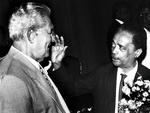A chat with Peter Abrahams
Published: Sunday | March 8, 2009

Contributed
Peter Abrahams (right) with former prime minister, Michael Manley.
Howard Campbell, Gleaner Writer
REAMS OF literature line the spacious living room of Coyaba, Peter Abrahams' home in the hills of Rock Hall, St Andrew. Two items reveal the evolving thinker: A copy of the book Caribbean Reasonings by Trinidadian Pan Africanist George Padmore, and a satellite dish that helps keep Abrahams in tune with world affairs.
The South Africa-born Abrahams turns 90 today. He and Daphne, his wife of 51 years, have lived at Coyaba since the mid-1950s when he first came to Jamaica at the behest of then Premier Norman Manley. To mark his birthday, the University of the West Indies will stage a symposium on March 11 at the Mona campus.
Abrahams and Jamaica's former security minister, Dudley Thompson, are among the survivors of a black intelligensia which emerged in England during the 1940s.
Enjoy retirement
The Abrahams are parents of three children who live in Europe; the couple enjoy retirement with their two dogs and pass the days "messing around the computer" and growing Noni on Coyaba's hillside.
He has a pronounced paunch and walks with a slight squat, but advanced age has not diminished Abrahams' thoughts or humour.
"As long as the mind is alive, how old I am is an interesting experience," he said in a laboured South African accent.
Professor Rupert Lewis, a senior lecturer at the University of the West Indies' Department of Government, says Abrahams is an "important figure" in Pan-African history.
"This is mainly due to him being the publicist for the Manchester Conference (of Pan-African leaders in 1945). His book, A Wreath for Udomo, anticipated the difficulties African leaders would face when they returned home," Lewis said.
Starting with Dark Testament and Mine Boy in the early 1940s, Abrahams has written extensively on the black man's struggle for civil rights in Africa and the West during the first half of the 20th century. Some of his other books, including Tell Freedom and The Coyaba Chronicles, are autobiographical.
Born in Johannesburg to an Ethiopian father and South African mother of mixed race, Abrahams fled his homeland in 1939 after the government charged him with treason. After two years working on a ship, he settled in England where his passion for black liberation fit in with a colony of Pan-Africanists in London that included West Indians Padmore and Thompson, and fellow Africans Jomo Kenyatta and Kwame Nkrumah.
"We were not necessarily communist, but radical. The black man had to be revolutionary in order to have self-respect," Abrahams said.
Abrahams was an established journalist when he arrived in Kingston in 1955 to write a book about Jamaica for the British Colonial Office. He had written for liberal publications like the Daily Worker and The Observer in England, and the New York Herald Tribune in the United States; Jamaica was an instant fascination.
Dirt poor
"It had a little over 600,000 people, was dirt poor and few black people had shoes. It reminded me of South Africa except for one thing; the racism was not law."
Abrahams admired Manley's intellect and vision of a self-sufficient Jamaica. At one stage he was editor of Public Opinion, a weekly publication with strong ties to the People's National Party (PNP), which Manley led. However, he was not taken with Alexander Bustamante, the populist leader of the rival Jamaica Labour Party (JLP) who was also Manley's cousin.
"I had nothing against him, but Busta was not the kind of person I could discuss ideas with," Abrahams said.
Supported most socialist policies
During the 1970s when Norman's son, Michael, was prime minister, Abrahams supported most of his socialist policies. In daily commentaries on Radio Jamaica, he addressed the turbulence of the decade which culminated with a resounding defeat for the PNP in the October 1980 general election.
In The Coyaba Chronicles, Abrahams is critical of Edward Seaga, the conservative JLP leader who became prime minister in 1980. He said he had never been partisan.
A question of values
"For me, it wasn't Seaga or Manley, it was a question of values," he stated. "I never knew what Seaga's ideas were, never knew what he represented."
Still, Abrahams believes the country's two major political parties have contributed to Jamaica's continuous decline. He says Norman Manley would not be pleased with the country's current standing.
"The political system went off the rails when government started getting big, Norman Manley was a man of the people who worked for the people," Abrahams said.
"I think he would have been most disappointed that Jamaica today is not able to feed itself."
